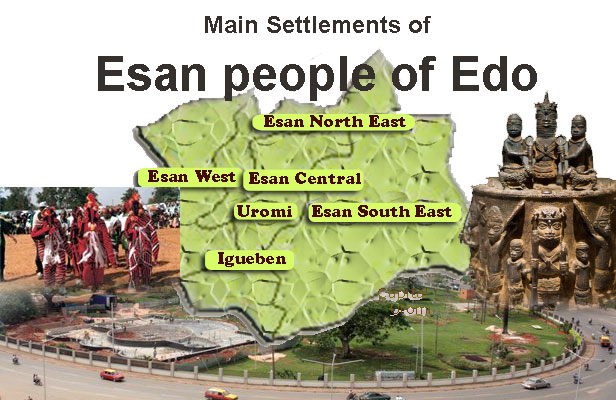



ESAN GEOGRAPHY
Esan land is bordered to the south by Benin City, to the south-east by Agbor, to the north and east by Etsako, to the west by River Niger. From Ewu to Benin City, the State capital, is 100 km long.
The people populate areas such as Uromi, Ewohimi, Ewatto, Igueben, Irrua, Ubiaja, Ogwa, Ebelle, Ekpon, Ewossa and Amahor, Ekpoma, Ohordua, and Ewu in central Edo State, South-South Nigeria. It has a flat landscape, lacking in rocks and mountains, and is good for agricultural purposes.
The topography of Esanland Ekpon plateau starts its rise from Ekpon and into six miles slope to Ewohimi, creating “Ekpon mini Plateau” . Ekpon is the gateway to Esanland, South East and the first of Esanland Kingdom therein as a border town, where centuries contacts with neighbors south in the Niger Delta, have influenced its Esan dialects by its earlier contacts through subsistence agriculture with the Ika speaking people of Igbanke, Oligie Igbodo etc.


Expert Peoples
At vero eos et accusamus etiusto odio praesentium.

First Growing Process
At vero eos et accusamus etiusto odio praesentium.

Creative Ideas
At vero eos et accusamus etiusto odio praesentium.

PRESENT DAY LOCAL GOVERNMENT AREAS
Esan Central L.G.A., with its headquarter in Irrua.
Esan West L.G.A., with its headquarter in Ekpoma.
Esan North-East L.G.A., with its headquarter in Uromi.
Esan South-East L.G.A., with its headquarter in Ubiaja.
Igueben L.G.A., with its headquarter in Igueben.
ESAN WAR
During the 16th century, the Uzea War occurred. This war was between the Uromi Kingdom and the Benin Kingdom. The war lasted from 1502 to 1503, and resulted from a refusal of friendship from Oba Ozolua of Benin by Onojie Agba of Uromi. The war ended at the town of Uzea, when both leaders were killed. However, in peaceful times Esan kingdoms would loan soldiers to the Benin Kingdom, such as during the Idah War of 1515-1516, and the sacking of Akure in 1823.
During the nineteenth century, northern Esanland was continually attacked and sacked by the Muslim Nupe people in the hunt for slaves and converts to Islam, having previously taken over the Kukuruku people's lands. Many Esan kingdoms from the south helped in the battle to fend off the Nupes. The battles came into the Esan's favor; several Nupe and Etsako warriors were brought into Esan cities where their posterity resides today. The nineteenth century brought the increasing influence of Europe on Esanland, as the English demanded palm products.
In 1897, the British sacked the Benin Empire, effectively leaving the Esans free from British rule. In 1899, the British led an invasion into the Esan kingdoms that lasted for seven years. Esanland proved to be harder to conquer than the Benin Kingdom because of its strong autonomy: Kingdoms chose to keep fighting the British even if its neighbors fell. Fallen Benin chiefs like Ologbosere and Ebohon were still resistant to British rule inadvertently guarded Esan soil from the west, by establishing military camps and blocking roads. This lasted from 1897 to April 22. 1899, where Ologbosere surrendered at the border village of Okemue.
The first kingdom to be attacked by the British was the Kingdom of Ekpon. Ekpon launched a fierce resistance against the British invasion on April 22, which nearly destroyed the kingdom. After the near genocide of Esans at Ekpon, the kingdom of Ekpon led an ambush of the British camp at Okueme, on April 29. This led British forces to retreat, consolidate their power, and kill Ologbosere in May. Subsequent attempts by the British failed as well: conquests into Irrua, for example, led to an adoption of a guerrilla warfare strategy followed by a retreat; this method was so successful that other Esan kingdoms adopted it and the British did not invade Esanland until 1901.
On March 16, 1901, the Kingdom of Uromi, headed by the old, yet intelligent Onojie Okolo, was attacked by the British. The Uromi resistance, led by Prince Okojie, was swift and employed guerrilla warfare. After a short time, British forces overtook the village Amedeokhian, where Okolo was stationed and murdered him. This angered Prince Okojie so much that he killed the Captain of the British troops before reinforcements were brought in. The British then realized that Uromi was nigh impenetrable without native help, and contact local sympathizers such as Onokpogua, the Ezomo of Uromi. This succeeded in napping Prince Okojie out of the forest and deported to the British offices at Calabar.


